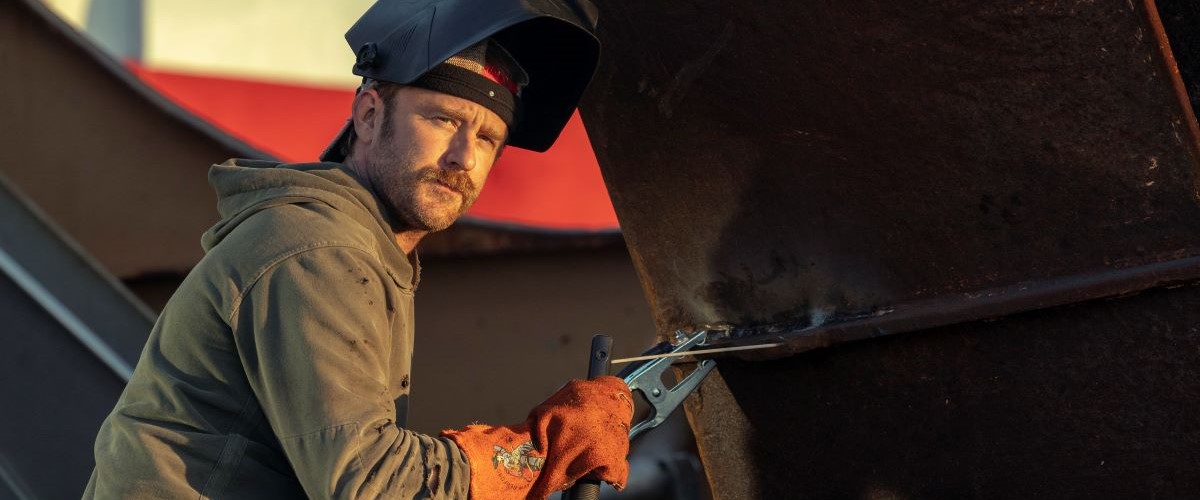Like its main characters, this movie is at its best on the sea. This film’s location, the fishing community of New Bedford, Massachusetts, is where writer/director Brian Helgeland, grew up, and like its characters, he worked on a boat that collected deep sea scallops over 100 miles offshore for two weeks at a time.
Before we see anything, we hear the sounds of the ocean, the calls of the birds, the splashes of the waves. We can almost smell the salt in the air. Then we see Tom (Ben Foster) on the dock. He is, as he will be throughout the story, metaphorically between the freedom and clarity of the open sea and the constraints found on land, the complications of family obligations and conflicts with the rules imposed by bosses and politicians and girlfriends and money.
We learn quickly that for Tom, life has only two parts: being on the water and waiting to go back on the water. It is another world, the horizon disappearing as the sky and the water blend together. Under the boat, there are whales.
Tom, like other characters in the movie, has a view about what it means to be a man. In his mind, the ideal of masculinity is being as free as possible from all constraints except those of the natural world. There is some mild hazing of newcomers, but there is an instant bond with anyone who chooses to be on the water. There are men in the story who work in offices and wear ties. They are seen by the sea-going characters as lesser individuals who are not willing to take on the hard, physical work suitable for men. The point of view of Helgeland understands guy-talk, meaning dialogue that is brief, sardonic, elliptical, as far as possible from any kind of emotion or vulnerability. “Not dead yet,” is all they say when they’ve been rescued from a near-fatal accident at sea, without a hint of grimness.
The one-word title is emblematic of all of those qualities. “Finestkind” is the name of a boat, but it is also an all-purpose term for pretty much anything anyone has to say. It’s “an expression of the trade.” It can mean anything from “that’s cool” to “f— you.” It is “the Swiss army knife of words.” That is not understatement; it is barely-statement.
Charlie (Toby Wallace) approaches Tom on the dock. They have not seen one another for a long time, but they are half-brothers and Charlie looks up to Tom. Their mother is Donna (Lolita Davidovich). She divorced Tom’s father, a boat captain known by everyone as Mr. Eldridge (Tommy Lee Jones), and later married a lawyer named Gary (Tim Daly), Charlie’s father.
Charlie has just graduated from college and has been accepted at law school. But he has turned down a job in his dad’s office because he wants to spend the summer crewing for Tom. He is also drawn to Mabel (Jenna Ortega), who has made some risky choices and may not be trustworthy, though she tries to assure Charlie that “It’s where I’m from, not where I’m going.”
Shortly after they go out on the water, disaster strikes. Mr. Eldridge persuades Tom to take his boat out. A different kind of disaster strikes, and suddenly Tom needs $200,000 to get the boat out of impound. And so, he takes on an even riskier job involving some very dangerous people. Another disaster.
Helgeland wants us to be caught up in the story of the brothers getting more and more mired in the consequences of their bad choices, but the most genuine relationship in the film is in a brief scene with the exes played by Jones and Davidovich. Foster is at his best in roles like this one, where his emotions are tightly coiled and always close to exploding, but the storyline does not give him much to work with and Wallace cannot make much out of a blandly-conceived role. By the time Charlie and Mabel are discussing Moby Dick while having sex, the ship has really run aground.
On Paramount+ now.




















